From studying stars and the Higgs boson to understanding fish ecology, DNA repair and cancer drugs, these innovative faculty members build on the college’s reputation for groundbreaking research and research-based teaching.
The College of Natural Sciences welcomes 18 new faculty members this fall. Whether studying stars and the Higgs boson or understanding fish ecology, DNA repair and cancer drugs, these innovative faculty members build on the college’s reputation for groundbreaking research and research-based teaching.
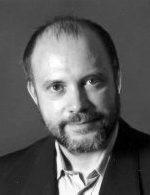 Francois Baccelli
Francois Baccelli
Professor, Department of Mathematics
Baccelli is a specialist in stochastic network theory. His research directions are at the interface of applied mathematics, probability, stochastic geometry, communications and information theory. He is co-author of research monographs on point processes, max plus algebras, queuing networks and stochastic geometry. His impact beyond the university can be measured by current and past projects with Alcatel, France-Telecom, AT&T Bell Laboratories, Intel, Sprint and Qualcomm. He received his doctorate from Paris University in 1983. He comes to The University of Texas at Austin from École normale supérieure in Paris where he led the research group on network theory in INRIA-Paris and held an academic appointment in computer science. He was professor of applied mathematics at Ecole Polytechnique (1991-2003). He has held visiting positions at the universities of Maryland, California-Berkeley and Cambridge, at the Mathematics Group of Bell Laboratories, and at Stanford, Eindhoven and Heriot-Watt Universities. He was elected as a member of the French Academy of Sciences in 2005.
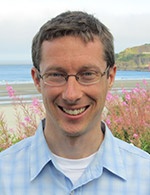 Bryan Black
Bryan BlackAssociate Professor, Department of Marine Science
Originally trained as a forest ecologist, Black applies dendrochronology (tree-ring analysis) techniques to the growth increments of fish, bivalve, and coral species. He received his bachelor’s of science at Westminster College in 1996 and earned his Ph.D. in 2003 from Pennsylvania State University. His resulting chronologies are used to establish long-term relationships between climate and productivity in marine and freshwater environments. Chronologies also provide a unique opportunity to compare growth patterns among diverse species and explore climate-driven linkages across terrestrial, freshwater, and marine ecosystems. Particularly long-lived species such as Pacific geoduck, a marine clam, are used to hind-cast climate over the past several centuries to quantify historical, pre-industrial ranges of environmental variability.
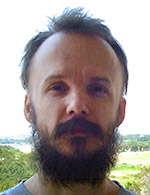 Lewis Bowen
Lewis BowenAssociate Professor, Department of Mathematics
Bowen received a Ph.D. from The University of Texas at Austin in 2002 and held positions at UC Davis, Indiana University, University of Hawaii and Texas A&M before joining UT Austin. His research lies in the area of ergodic theory and geometric group theory. He received the NSF CAREER award in 2010.
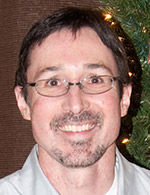 Michael Daniels
Michael DanielsProfessor, School of Biological Sciences
Daniels was most recently professor and chair in the Department of Statistics at the University of Florida. Before that, he spent five years on the faculty at Iowa State University and two years at Carnegie Mellon University. He received his doctoral training in biostatistics at Harvard University in the early 1990s. He is a fellow of the American Statistical Association and co-author of a well-received research monograph on Bayesian methods for missing data in longitudinal studies. The focus of his research program revolves around incomplete longitudinal data with special attention to estimation of the dependence structures, and more recently, methods for causal inference with applications to mediation. His current collaborations include clinical trials in weight management and muscular dystrophy and questions involving the impact of recent Medicare legislation on 'preventable' hospital outcomes.
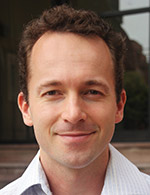 Bryan Davies
Bryan DaviesAssistant Professor, School of Biological Sciences
Davies earned his bachelor’s degree in biochemistry at McMaster University and Ph.D. in molecular biology at the Massachusetts Institute of Technology. Davies’ graduate research explored many areas including responses to DNA damage, ribosome maturation and plant/bacteria symbiosis. During his postdoctoral fellowship at Harvard Medical School, Davies fused traditional genetics with functional genomics and mass spectrometry to decipher virulence gene regulation in the bacterial pathogen Vibrio cholerae. While continuing his research on gene networks required for V. cholerae virulence, he has expanded his investigations to the environmental persistence of hospital pathogens. This latter project aims to understand how certain bacteria can thrive in the hospital setting and how cleaning practices can be improved to help slow the transmission of antibiotic resistant bacteria to and between patients.
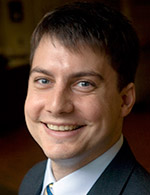 Paul Eastwick
Paul EastwickAssistant Professor, School of Human Ecology
Eastwick’s research investigates how people initiate romantic relationships and the psychological mechanisms that help romantic partners to remain committed and attached. One of his research programs examines how the qualities that people say are critically important to them in a romantic partner — their ideal partner preferences — direct romantic partner selection and retention. Additionally, his work draws from anthropological data on the time course of human evolution to make novel psychological predictions. He has also explored the intersection of race and romantic attraction and how online dating differs from traditional ways that people meet and evaluate romantic partners.
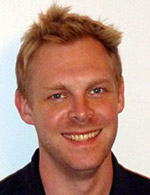 Andrew Esbaugh
Andrew EsbaughAssistant Professor, Department of Marine Science
Esbaugh received his bachelor’s of science with honors from Acadia University (Nova Scotia, Canada) in 2001, and his Ph.D. in biology from Queen’s University (Ontario, Canada) in 2005 under the supervision of Dr. Bruce Tufts. He studied as a post-doctoral fellow at the University of Ottawa from 2005-2009, with two years as an NSERC fellow, under the supervision of Drs. Steve Perry, Katie Gilmour and Pat Walsh. This was followed by a post-doc position at the University of Miami, Rosenstiel School of Marine and Atmospheric Science from 2009 to 2012 with Dr. Martin Grosell. Andrew’s research interests focus on how the physiological systems of fish are adapted to varying environments, and their ability to be flexible in response to environmental change. He is particularly interested in questions pertaining to gas transport, acid-base balance and osmoregulation. Additionally, he is interested in the impacts of environmental contaminants such as metals and poly-aromatic hydrocarbons on fish physiology.
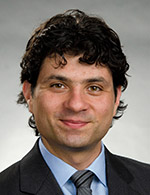 Ilya Finkelstein
Ilya FinkelsteinAssistant Professor, Department of Chemistry and Biochemistry
Finkelstein received his bachelor’s of science from the University of California at Berkeley and his Ph.D. in Chemistry from Stanford University with Professor Michael D. Fayer. In 2007, he moved to the group of Prof. Eric C. Greene at Columbia University Medical Center as an NIH Postdoctoral Fellow. In 2012, Finkelstein joined the University of Texas at Austin as a CPRIT Scholar in Cancer Research. A unifying theme of his research career is the development and application of biophysical methods that can observe proteins as they undergo their physiological functions in real time. Finkelstein’s research interests at the University of Texas at Austin are focused on understanding how our cells are able to stave off genomic instability and avoid cancer. Finkelstein's highly interdisciplinary research program combines aspects of single-molecule biophysics, traditional biochemistry and micro-/nano-scale engineering to directly observe the key biochemical steps of DNA repair.
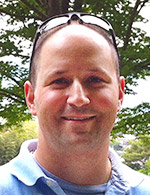 Steve Finkelstein
Steve FinkelsteinAssistant Professor, Department of Astronomy
Finkelstein received a bachelor’s of science in physics and astronomy from the University of Washington in 2003 and a Ph.D. in physics from Arizona State University in 2008. From 2008-2011, he was a postdoctoral researcher at Texas A&M University before bringing the prize Hubble Fellowship to The University of Texas at Austin last year. His research focuses on the discovery and characterization of the most distant galaxies in the universe, with an emphasis on studying their evolution from that distant epoch to today. This primarily involves observations with the Hubble Space Telescope, although it does include ground-based observations. He will make use of the university’s McDonald Observatory, especially in the future with the addition of the Giant Magellan Telescope. He has been married for four years to his wife Keely, who is a research associate and lecturer at the university, and they have a two-year old son, Kieran.
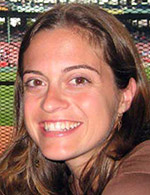 Amber Hardison
Amber HardisonAssistant Professor, Department of Marine Science
Hardison is a marine biogeochemist at the Marine Science Institute. She received her Ph.D. in marine science at the Virginia Institute of Marine Science, College of William and Mary, and was then a postdoctoral research associate at Brown University. Her research aims to unravel the dynamic processes influencing nitrogen and carbon cycling in marine systems and the impacts of human and climatic processes on these cycles. Her research approach combines isotopic, organic geochemical, and molecular techniques in both experimental and field settings to study the sources and fates of carbon and nitrogen in estuarine and marine ecosystems and the role of sediment microbes in processing these nutrients. By linking sediment biogeochemistry with microbial ecology, her research has demonstrated the key buffering role that microbes play in these demonstrated the key buffering role that microbes play in these ecosystems, both in terms of nitrogen retention in microbial biomass and nitrogen release through novel processes, such as anaerobic ammonium oxidation (anammox).
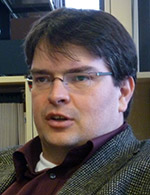 Bjorn Manuel Hegelich
Bjorn Manuel HegelichAssociate Professor, Department of Physics
Hegelich is joining the Physics Department as associate professor. His research includes relativistic laser-matter interaction (RLMI), advanced accelerators, high energy density physics, and extreme field physics. Before joining UT he was a team leader at Los Alamos National Laboratory. He was a visiting professor for “Relativistic Laser Particle Acceleration for Nuclear Physics and Medicine” and fellow at the Center for Advanced studies at the Ludwig-Maximilian University (LMU) München from 2008-2011. Hegelich graduated from Napier University Edinburgh and Georg-August University of Göttingen and obtained his doctorate at LMU München, pioneering ion acceleration with ultrahigh intensity lasers. His research highlights include the first demonstrations of high efficiency, MeV, Z > 1 laser-driven ion acceleration, of mono-energetic laser-ion acceleration, and the first demonstration of ion acceleration in Transparent Overdense Plasmas. His team holds the world records for laser proton acceleration at 190 MeV, carbon acceleration to 1GeV. These ions are of interest in applications from fusion energy to cancer therapy. They have already been utilized to produce the world’s brightest neutron source with 1019 neutrons/cm2/s.
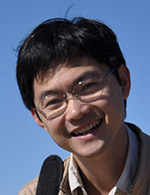 Keji Lai
Keji LaiAssistant Professor, Department of Physics
Lai grew up in Nanning, a mid-sized city in southern China, and went to Tsinghua University in Beijing for his undergraduate study in Electrical Engineering. In 2001, Lai came to the U.S. as a graduate student in Prof. Daniel Tsui’s group at Princeton University. His Ph.D. thesis was devoted to understanding the transport properties in silicon two-dimensional electrons. After graduation in 2006, Lai moved to Prof. Zhi-Xun Shen’s group at Stanford University as a Karel Urbanek Postdoc and was later awarded the KAUST Global Research Partnership Postdoc Fellowship. His research interest was to study the nanoscale electromagnetic properties of complex quantum materials by near-field microwave imaging. He has also worked on the growth and characterization of topological insulator nanostructures.
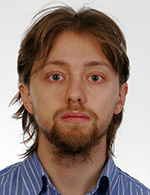 Franceso Maggi
Franceso MaggiAssociate Professor, Department of Mathematics
Maggi has joined the department as an associate professor. He received a Ph.D. in mathematics from the University of Florence in 2004. He has been working at the Max Planck Institute for Mathematics in the Sciences in Leipzig, at the University of Duisburg-Essen, and at the University of Florence, giving invited lectures in Italy, Germany, France, Portugal, Spain, Switzerland, Scotland, England, Canada, and the US. His research interests are in the area of calculus of variations and geometric measure theory.
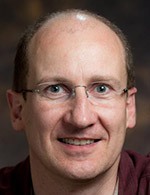 Andreas Matouschek
Andreas MatouschekProfessor, School of Biological Sciences and Department of Chemistry and Biochemistry
Matouschek earned his first degree in biology at the Ludwig Maximilians University Munich and a Ph.D. with Alan Fersht in the chemistry department of the University of Cambridge. He then did a postdoc with Jeff Schatz at the Biocenter of the University of Basel before moving to Northwestern University in Evanston, Illinois as an assistant professor. Matouschek’s graduate research investigated the mechanism of protein folding in vitro and his postdoctoral work studied protein import into and folding in mitochondria. Matouschek’s own lab has tried to understand more complex biological processes such as the Ubiquitin Proteasome System in the mechanistic detail with which some simple enzymatic reactions are understood. The goal is that the findings will reveal novel principles of cellular regulation and allow us to engineer new functions into cells.
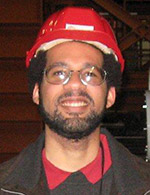 Peter Onyisi
Peter OnyisiAssistant Professor, Department of Physics
Onyisi studies particle physics at the highest energies available in a laboratory, using data from the Large Hadron Collider proton accelerator in Geneva, Switzerland. He was a member of one of the teams that reported evidence for the long-sought-after Higgs boson in July 2012. This particle, the visible manifestation of a field that fills all of space, has deep connections to the structure of fundamental physical laws and the evolution of the universe. He also has a strong interest in the computational and data access aspects of the field and the use of new software and hardware technologies. He received his Ph.D. from Cornell University and bachelor’s of arts from the University of Chicago.
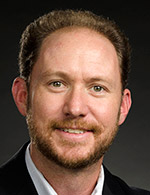 Michael Rose
Michael RoseAssistant Professor, Department of Chemistry and Biochemistry
Rose received his Ph.D. in bio-inorganic chemistry from the University of California, Santa Cruz under the supervision of Pradip Mascharak. There he focused the synthesis of chromophore-sensitized ruthenium nitrosyls for photo-delivery of nitric oxide to cancer cells. Rose also synthesized biomimetic models of the iron-sulfur enyme, nitrile hydratase, which reversibly binds NO under illumination. Rose then held NSF postdoctoral fellowships at the California Institute of Technology under Harry Gray and Nate Lewis. He focused on the synthesis of fluorinated iron catalysts for electrocatalytic hydrogen generation. A second project involved covalent attachment of molecular catalysts to semiconductor photoelectrodes. The aim of Rose's research is to unlock new synthetic targets in inorganic chemistry to provide novel, inexpensive routes for fuel generation and utilization. His projects involve late first-row transition metals, heavy main group elements, and photoelectrode functionalization.
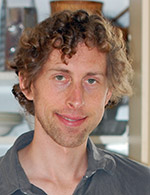 Travis Schedler
Travis SchedlerAssistant Professor, Department of Mathematics
Schedler completed his Ph.D. under Victor Ginzburg at the University of Chicago in 2008, in the area of noncommutative algebraic geometry, after undergraduate studies at Harvard and a year at the Ecole Normale Superieure in Paris. He then held a five-year fellowship from the American Institute of Mathematics concurrently with a C.L.E. Moore Instructorship at MIT. Schedler has written over 25 research articles on subjects including Hochschild and Poisson homology, quantization, geometrization, and homotopical algebra. He has lectured at universities and conferences worldwide, co-directed a two-week graduate summer school at Berkeley, and directed eight MIT undergraduate and high school research projects. Schedler enjoys public service; he ran six two-week "Absolute Value Math Camp" programs for Chicago youth and participated for three years as a Big Brother in the "Big Brothers Big Sisters" program. Schedler plays the piano and organ (the latter which he studied at a Paris conservatory), enjoys running, and has competed in two triathlons and a marathon.
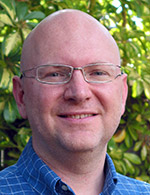 Stefano Tiziani
Stefano TizianiAssistant Professor, School of Human Ecology
Tiziani is interested in understanding how drug-induced modulation of tumor metabolism and nutrient microenvironment affect cancer treatment outcomes. Combination therapies are often needed for effective clinical management of complex diseases. Discovery of new drug combinations is hampered by the vast space of possibilities created when more than a few drugs over a range of doses are considered. The goal of his research is to combine high-throughput screening measurements, magnetic resonance spectroscopy and mass spectrometry-based metabolomics, metabolic flux analysis and other omic data to gain a better bio-mechanistic understanding of the effects of combined drug treatment in a disease setting. The systematic combination therapy optimization effort might provide unique information about the selectivity of the treatment towards the specific disease, which can be rapidly translated in a personalized drug treatment.

















Comments 7
The College of Natural Sciences is committed to supporting the best and brightest faculty and building a diverse community. We will be addressing this during our forthcoming strategic planning process.
Why are there so few women new faculty? I think UT needs to make a concerted effort in bringing more women science faculty.
Diane, Patricia and Ellen,
I hate to come off as rude, but don't you think the University of Texas hires professors solely based on their credentials and not their race or gender? If I had to guess these people were probably the best candidates for their respective jobs. I'm sure if there were more women than men hired men wouldn't be throwing a fit because that would be sexist. The double standard needs to stop. Just because some white guys got a job doesn't mean the University is sexist or purposefully not hiring women. The bottom line is the most qualified people should get the jobs. Period. And if that means no women are hired, fine. If it means no men are hired, fine. Stop throwing the gender/race card in everyone's face when something like this happens.
Kyle Bouthilet
The first thing that struck me is that there is only one woman out of the eighteen. Minority status is harder to determine, but it also appears that minorities are not well represented. I concur with the earlier comment that UT should be making a more concerted effort to bring women and minorities to its faculty.
While the credentials of the new faculty are extremely impressive, I, too, am amazed that we are not hiring more women.
Ellen Morrison
Kyle --
You are falling into the same over-simplifying trap that many fall into: the issue is not that UT should hire more women faculty even if they are not as qualified but that UT search committees need to FIND those highly qualified junior women. The common search techniques and practices in the sciences and engineering still rely on the "old boys'" network. There are qualified PhD graduates in the sciences out there who are women, but for many reasons they can be harder to find or to convince to join a heavily-male faculty.
Judging by their names and appearance, this seems to be a fairly diverse group, with the exception of gender.
The question always remains as to the presence of a level playing field with regard to gender, race, ethnicity, religion, sexual preference and age. I would expect well-thought-out, fair-minded hiring policies and oversight to be in place at the University of Texas. I would also assume that critics of the hires would recognize that the term "old boy network" is a very bigoted and prejudicial one, the use of which negates any claim to stand for equality and respect for others.